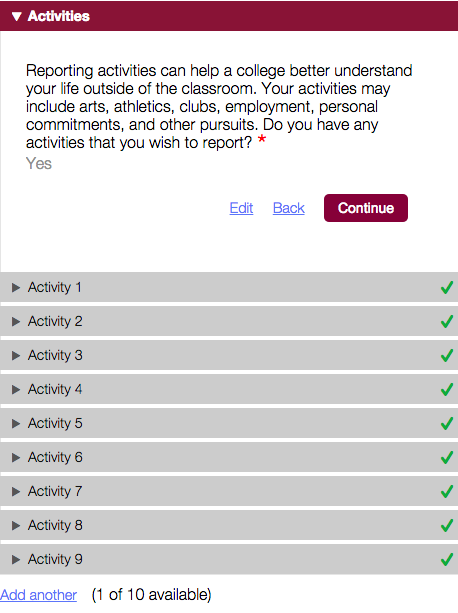“Reporting activities can help a college better understand your life outside of the classroom. Your activities may include arts, athletics, clubs, employment, personal commitments, and other pursuits. Do you have any activities that you wish to report?” So reads the activities section listed on the Common Application, with ten options to fill out. Although this is not obviously the only portion you answer, it is the portion where students tend to most overestimate themselves.
Exaggerating academics achievement, also known as grades, is a clear violation and can easily be caught by colleges checking in with your high school. But activities are up to you because you choose them and commit to them.
A lot of times, we hear and see students taking advantage of an opportunity a single time, but never dedicating themselves to it. For example, making a one-time appearance at a club meeting never means that you are its leader, let alone its member. It is only through constant connections, relations, and hard work that you become officially qualified as part of the club. Illyssa Gainsley ‘16 explains how, “A lot of people have lied saying that they are in clubs that they aren’t actually in, which isn’t fair. I get it though, it is an easy opportunity to add to your application, because how is there any consequence for that? College counselors should look over it [for regulation].” Another example can easily be reflected in sports. Whatever level you play at, students are likely to play trump cards of being responsible by cleaning up after practice, or being supportive of other members; many would just recognize that as “sucking up” to the coaches, and putting away a few sports balls doesn’t make you a hero.
Why you stand out more than others and what qualities you have as an individual are unique and important to everyone, there’s no argument there… However, a false decoration of this won’t show an individual much success, let alone good. Let’s say someone with this embellished type of college application got accepted to a certain university that they had applied to. It just simply wouldn’t be right.
Allen Wang ‘16 notes how, “It is definitely a thing, it is troubling, and frankly, I find it frustrating. My position on it, at least my relationship with college applications, is I have done what I have done in high school, whether or not I am accepted based on it is a matter of their choice, but I don’t feel the need to compromise my own personal integrity towards myself for the sake of getting into college.”
In terms of students applying to the same university, one student’s embellishment may costs another’s acceptance, and an embellished application furthers compromises the dubious student’s integrity, especially if accepted over other honest applicants. While a student may profit from the lie by getting to attend an institution, the institution itself loses too because instead of gaining an accomplished, well-rounded individual, it lets a scammer through its doors.
“It is essential to be honest on the application because students sign a statement that indicates that they have presented truthful information, and if it comes to light that the student has misrepresented themselves, their application can be rescinded, ” explains college counselor, Sara Kyle.
College applications are the seniors’ opportunity to show themselves to the world for who they truly are, and no amount of exaggeration on paper will ever help to prove that in person. Instead of creating an overemphasized description of a temporary appeal in your life that stopped short in a matter of time, illustrating another side to oneself is more genuine, more touching, and more inspirational. This is the advantage that everyone should take, and an opportunity that holds most benefits and value.






